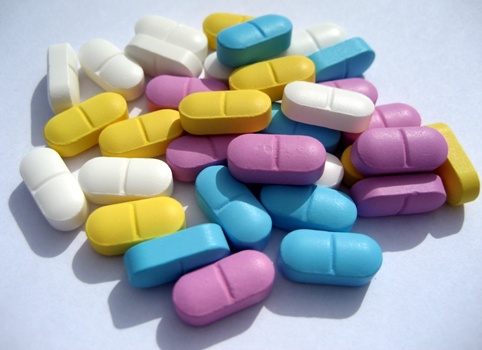
The Many Faces Of Vitamin B
When vitamins were first discovered, scientists believed that there was just one vitamin that came to be known as vitamin B. Scientists later came to realize that there were actually many different chemicals that worked together in the body, each of them coming from food. These include vitamin B1, also known as thiamin, vitamin B2, also known as riboflavin, vitamin B3, also known as niacin or niacinamide, vitamin B5, also known as pantothenic acid, vitamin B6, also known as pyridoxine (and by several other names), vitamin B7, also known as biotin, vitamin B9, also known as folic acid, and vitamin B12, also known as various forms of cobalamine. Each of these forms of vitamin B is individually essential to human health, and each of them has to come from food or supplements.
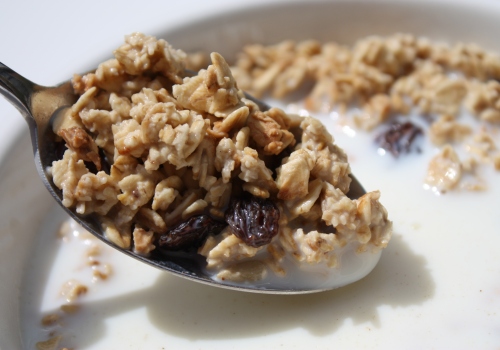
What You Need to Know About Vitamin B1 (Thiamin)
Americans who were baffled by President George W. Bush's peculiar uses of the English language may be interested to know that his speech patterns are characteristic of a condition caused by deficiency in vitamin B1, also known as thiamin. This water-soluble vitamin is abundant in many foods, including vitamin-enriched bread, vitamin-enriched breakfast cereal, lean pork, oranges, spinach, pecans, lentils, and brown rice. Deficiency in vitamin B1 can cause a potentially fatal condition in the central nervous system known as beri-beri; however, it is far more likely for vitamin B1 deficiency to result in cataracts, congestive heart failure, Parkinson's disease, or Alzheimer's disease. People most likely to need a vitamin B1 supplement are those who drink alcohol on a regular basis and people who take the duretic drug Lasix (furosemide).

What You Need to Know About Vitamin B3 (Niacin)
Vitamin B3, also known as niacin or nicotinamide, is a co-factor for over 200 different enzyme reactions throughout the body. The human body can make some of the niacin it needs, but not enough, from the amino acid trytophan, the calming substance we consume in warm milk and also in turkey. Severe deficiency of vitamin B3 can result in a particularly nasty skin disease called pellagra, once common in the Po Valley of northern Italy and in the American South. Certain kinds of slow-growing cancerous tumors (the carcinoid tumors) and prolonged use of antidepressants or therapy for tuberculosis can result in a need for vitamin B3 supplementation. It is possible to manage cholesterol levels with high-dose vitamin B3 supplementation, but don't use a slow-release form if you have liver disease (or if you don't know whether you have liver disease), and don't take vitamin B3 supplements if you have the form of acne known as rosacea.
- Important notification about information and brand names used in this slideshow!
- Photo courtesy of Alpha by Flickr : www.flickr.com/photos/avlxyz/2121526921/
- altmedicine.about.com/od/herbsupplementguide/a/B-Complex.htm
- http://en.wikipedia.org/wiki/B_vitamins
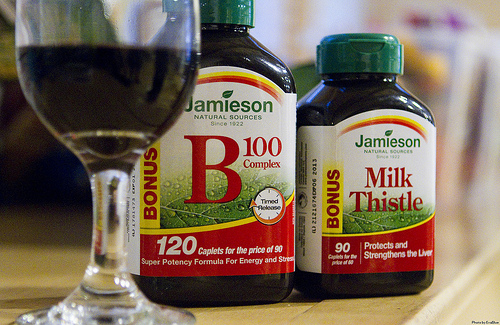
What You Need to Know about Vitamin B2 (Riboflavin)
Vitamin B2, the B vitamin better known in the English-speaking world as riboflavin, is essential to the operation of many of the body's antioxidants, especially a compound called glutathione peroxidase. The body also requires riboflavin to be able to use certain other B vitamins including vitamin B6, niacin, and folic acid. It's not hard to get enough vitamin B2. Most people get more than their daily requirement of the vitamin by eating bread or cereals made with factory-enriched grains. People who get lots of exercise or who do physical labor resulting in heavy perspiration may need a vitamin B2 supplement, as many women who have had preeclampsia and certain individuals who have a hereditary enzyme deficiency in a compound that activates riboflavin into a form the human body can use.
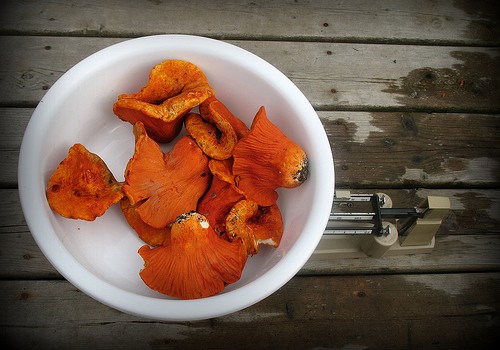
What You Need to Know About Vitamin B5 (Pantothenic Acid)
Vitamin B5 is often touted as a miracle treatment for adult acne, and it actually seems to be, for rosacea, and for people who have Asian skin types. The vitamin is also important for the conversion of LDL ("bad") cholesterol into the HDL ("good") form. It is extremely rare for anyone to have a vitamin B5 deficiency; when they do, the result is a painful condition of nerve damage in the hands and feet called neuropathy. Vitamin B5 can also be used as part of a program to lower cholesterol. There's lot of vitamin B5 in avocados, yogurt, lentils, chicken, split peas, mushrooms, and lobster, and it is also available as an over-the-counter nutritional supplement.

What You Need To Know About Vitamin B6 (Pyridoxine)
Vitamin B6 is essential to healthy brain function. It is also necessary in combination with folic acid and vitamin B12 for regulating the body's processing of homocysteine, a biologically necessary pro-inflammatory substance that can damage brain tissue and the linings of blood vessels when present in excess. Vitamin B6 helps the body break down excessive homocysteine and also to make a calming, antidepressant compound known as S-adenosylmethionine, or SAM-e. You get vitamin B6 in baked potatoes served in their skins, spinach, hazelnuts, bananas, salmon, and turkey. It's also available as a supplement. Women who use oral contraceptives tend to be deficient in vitamin B6, and B6 supplements support recovery from morning sickness, PMS, depression, and carpal tunnel syndrome.
- Important notification about information and brand names used in this slideshow!
- Photo courtesy of antSthetic by sxc.hu : www.sxc.hu/photo/150531
- altmedicine.about.com/od/herbsupplementguide/a/B-Complex.htm
- http://www.wholeliving.com/134086/benefits-b-vitamins

What You Need to Know About Vitamin B7 (Biotin)
Biotin is the skin vitamin. Make sure you get enough biotin to prevent the production of sticky, yellow excess sebum, which can cause clogged pores and flaky dandruff. Biotin is also important to diabetics. With alpha-lipoic acid, niacin, and L-carnitine, biotin affords antioxidant protection of the energy-making mitochondria of muscles cells, allowing diabetics to burn more sugar during exercise before sugar-burning processes shut down. Biotin deficiency is rare, but easy to detect. People who don't get enough biotin tend to have rashes, oily skin, brittle nails, falling hair, and "biotin deficiency faces," with unusual, lumpy distribution of fat beneath the skin. There is lots of biotin in liver and also in eggs and in yeast, and smaller amounts in salmon, pork, avocado, yeast breads, raw cauliflower, and raspberries. If there is any single B vitamin you are likely actually to need to take as a supplement, it is biotin.
- Important notification about information and brand names used in this slideshow!
- Photo courtesy of Tracy Hunter by Flickr : www.flickr.com/photos/tracyhunter/140042681/
- altmedicine.about.com/od/herbsupplementguide/a/B-Complex.htm
- http://www.wholeliving.com/134086/benefits-b-vitamins
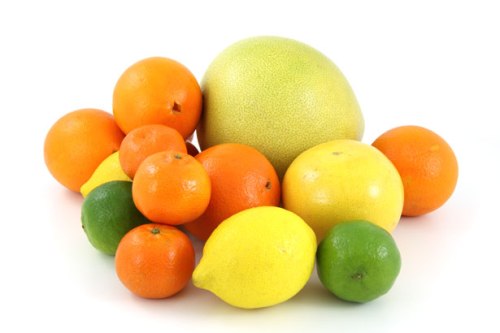
What You Need to Know About Vitamin B9 (Folic Acid, aka Folate)
It's not easy not to get enough folic acid if you live in the USA or Canada. Because getting enough folic acid during the early weeks of pregnancy is essential for preventing birth defects such as spina bifida and fetal alcohol syndrome, this B vitamin is added to all kinds of vitamin-fortified foods. Not getting enough folic acid can result in high levels of an brain- and blood vessel-inflammation chemical called homocysteine. People who drink heavily are the most likely to need supplemental folic acid. About 20% of the population lacks certain enzymes the body needs to process folic acid and may also need to take a folic acid supplement. This B vitamin is particularly abundant in vitamin-enriched breads, cereals, and rice, and in orange juice, spinach, lentils, lima beans, garbanzo beans, and asparagus.

What You Need to Know About Vitamin B12 (Cyanocobalamin)
Vitamin B12 is a nutrient that is almost impossible to get from plant foods. Even vegans get their B12 from animal sources. A study of Hindu vegans in England eventually found that vitamin B12 deficiency resulted from washing tiny insects off vegetables, a practice not followed in India. Just the amount of B12 in an occasional aphid unnoticed on the underside of a leaf was enough to prevent B12 deficiency. Becoming deficient in vitamin B12 takes a very long time, even if you follow a vegan diet, and taking a single B12 shot at the doctor's office may be enough to remedy deficiency for several months or even several years. Get your B12 from any animal-based food but especially from mussels, clams, or crab, or from nutritional supplements. Not getting enough B12 can result in increased risk of cardiovascular disease, breast cancer in women, or Alzheimer's.






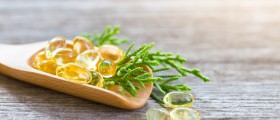
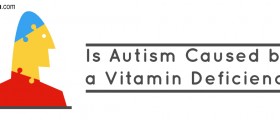


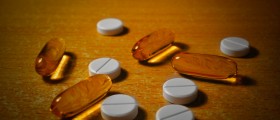

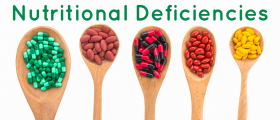


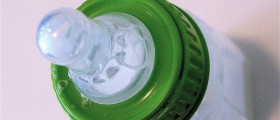
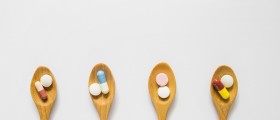
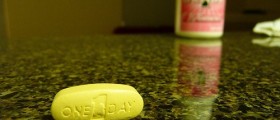


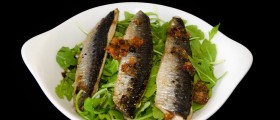


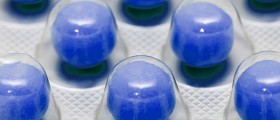
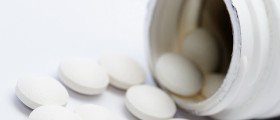
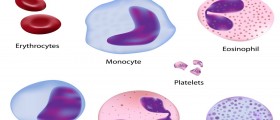
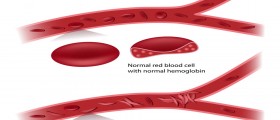
Your thoughts on this
Loading...